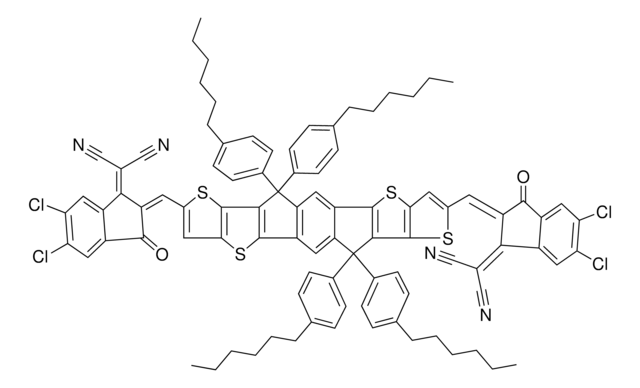753955
ICBA
99% (HPLC)
Sinónimos:
1′,1′′,4′,4′′-Tetrahydro-di[1,4]methanonaphthaleno[1,2:2′,3′,56,60:2′′,3′′][5,6]fullerene-C60, C60 derivative, indene-C60 bisadduct
About This Item
Productos recomendados
Quality Level
assay
99% (HPLC)
form
solid
loss
0.5 wt. % TGA, 235 °C
mp
253-260 °C
orbital energy
LUMO 3.67 eV (CV)
OPV device performance
ITO/PEDOT:PSS/P3HT: ICBA (1:1)/Al
ITO/PEDOT:PSS/P3HT:ICBA(1.5:1)/LiF/Al
¿Está buscando productos similares? Visita Guía de comparación de productos
General description
Application
signalword
Warning
hcodes
Hazard Classifications
Eye Irrit. 2 - Skin Irrit. 2 - STOT SE 3
target_organs
Respiratory system
Storage Class
11 - Combustible Solids
wgk_germany
WGK 3
flash_point_f
Not applicable
flash_point_c
Not applicable
Elija entre una de las versiones más recientes:
¿Ya tiene este producto?
Encuentre la documentación para los productos que ha comprado recientemente en la Biblioteca de documentos.
Los clientes también vieron
Artículos
Organic materials in optoelectronic devices like LEDs and solar cells are of significant academic and commercial interest.
Organic materials in optoelectronic devices like LEDs and solar cells are of significant academic and commercial interest.
Organic materials in optoelectronic devices like LEDs and solar cells are of significant academic and commercial interest.
Organic materials in optoelectronic devices like LEDs and solar cells are of significant academic and commercial interest.
Nuestro equipo de científicos tiene experiencia en todas las áreas de investigación: Ciencias de la vida, Ciencia de los materiales, Síntesis química, Cromatografía, Analítica y muchas otras.
Póngase en contacto con el Servicio técnico

![[6,6]-Phenyl C61 butyric acid methyl ester ≥99%](/deepweb/assets/sigmaaldrich/product/structures/359/221/d990c746-0960-4c69-bf76-fe09b193824d/640/d990c746-0960-4c69-bf76-fe09b193824d.png)



![[6.6] Diphenyl C62 bis(butyric acid methyl ester)(mixture of isomers) 99.5%](/deepweb/assets/sigmaaldrich/product/structures/213/478/93c26667-6556-40bb-8cbe-350bdbabfc00/640/93c26667-6556-40bb-8cbe-350bdbabfc00.png)

![4-(1′,5′-Dihydro-1′-methyl-2′H-[5,6]fullereno-C60-Ih-[1,9-c]pyrrol-2′-yl)benzoic acid](/deepweb/assets/sigmaaldrich/product/structures/417/736/540e4dd8-0c87-48e5-8307-3befb16498ba/640/540e4dd8-0c87-48e5-8307-3befb16498ba.png)

![2-{[7-(5-N,N-Ditolylaminothiophen-2-yl)-2,1,3-benzothiadiazol-4-yl]methylene}malononitrile 99% (HPLC)](/deepweb/assets/sigmaaldrich/product/structures/369/847/83afd245-0ae2-49bf-b44e-bcc0dd348c82/640/83afd245-0ae2-49bf-b44e-bcc0dd348c82.png)
